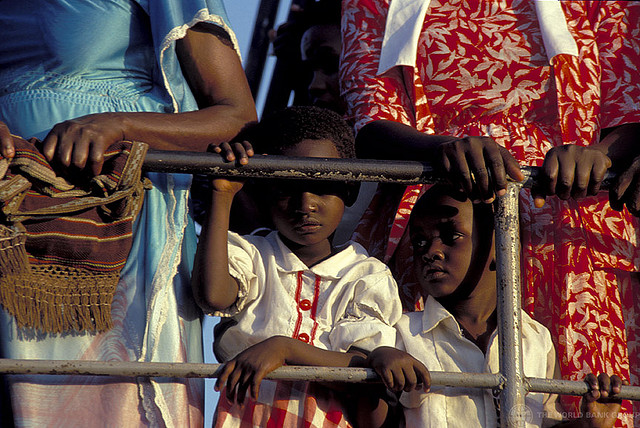"Gender equality is far from being achieved "
April 11 Affirmative action has come under fire from those who think women have achieved equal opportunity with men, but Amina Adhan, 22, a Correspondent from Nairobi, Kenya, argues it is needed when patriarchal culture is a hindrance to the goal of gender equality.
Affirmative action has come under fire from those who think women have achieved equal opportunity with men, but Amina Adhan, 22, a Correspondent from Nairobi, Kenya, argues it is needed when patriarchal culture is a hindrance to the goal of gender equality.
While women’s rights have been sluggishly progressive in most parts of the world, gender equality is more elusive. The biggest impediment to gender parity remains patriarchal cultures that shape all facets of life.
While some argue that women are now at par with men in access to social, economic and political rights and cite affirmative action as a cause, recent events in the Kenyan parliament refute that claim.
Women legislators walked out of Kenya’s parliament in protest after legislators passed a polygamy law that does not necessitate a man to seek consent of his first wife before marrying another. The law reveals a rotten underbelly of Kenya’s political scene. The policy overwhelmingly supported by male legislators indicates power relations between the sexes; women are not considered partners in marriage but inferiors. While the quota system improved access, it has been grueling for women to effectively participate in policy making, a factor attributed to male domination in policymaking institutions as evidenced by the regressive policies passed. The Matrimonial Property Act of 2013 overturned the 50-50 sharing of matrimonial property after dissolution of marriage in favour of “contribution”-based sharing. While the contribution clause entails both monetary and non-monetary forms, the burden of proof falls on women. This disadvantages the majority of women whose lives revolve around informal labor such as domestic chores and child rearing.
Affirmative action for women in itself has faced strong criticism by those who believe that women have an equal opportunity to compete with men. The two thirds gender rule enshrined in article 27(8) of the constitution of Kenya states “that not more than two thirds of members in elective or appointive positions are of the same gender”. Opponents of affirmative action portray it as imposed leadership by women. A Kenyan Member of Parliament was recently quoted “we should not be donating seats to women, positions reserved for women should be scrapped”. This was the MP’s proposal to resolve Kenya’s inflated wage bill and bloated representation, which arose with the devolved system of government.
Dorothy Kweyu, an editor of Kenya’s Daily Nation paper, in an article on women leadership articulates the notion that patriarchy has been overcome by citing the fact that the number of girls in primary and secondary schools has risen since independence. She goes on to argue that women are well educated and therefore the two thirds gender rule is a scheme for women to gain easy access to leadership positions and does not promote substantial gains for all women . She further notes that gender equality is difficult because it seeks to achieve 50-50 representation in politics.http://mobile.nation.co.ke/blogs/womens-leadership-PATRIACHY/-/1949942/2049200/-/format/xhtml/-/11sbbyfz/-/index.html
Gender equality has been misconstrued to be synonymous with female empowerment and male disempowerment. The goal of gender equality however, is to ensure equal access to social, economic and political rights by both girls and boys, men and women. While it may be true that girls’ enrollment into schools is higher, such an argument is oblivious to the challenges girls face in education. There is still inequality in access of education; the girl child has to deal with the realities of deeply rooted patriarchal cultures. It is such cultures that dictate gender-defined roles whereby the girl is required to attend to domestic chores, reducing time available to engage in learning compared to boys. Furthermore one cannot discuss access to education for girls without considering the fact that lack of access to sanitary pads hinders full participation in education for many girls. It is estimated that on average a girl from an underprivileged family will miss three days of school each month due to lack of sanitary pads. While the government has tried to deal with this challenge, there is no commitment as evidenced by the budget cut to a ministry of education program that would supply sanitary pads to needy girls. The 99bn budget cut in 2013/2014 from the previous 300bn was detrimental to free universal primary education for girls. The expose by Citizen TV shows the gravity of the matter http://www.youtube.com/watch?v=1hn822TrKXo
On access to leadership, as much as women may be qualified for elective positions, time and again it has been proved that societal norms hinder access to the political scene. In Kenya affirmative action has increased women representation in legislative institutions, and it remains relevant since structural barriers that necessitated affirmative action such as patriarchy are still present. In highly patriarchal societies, gender plays a big role in deciding what rights and freedoms an individual can access. Sexism is particularly dominant in politics. There is emphasis on the public man and the private woman as Jean Bethke articulated decades ago. Equality in public life for women is hindered by barriers to work unique to women such as lack of provision of child care. While women legislators have fought for and gained such rights at work the majority of women have no access to the same.
Opponents of affirmative action should note that it is crucial now more than ever to push for the full implementation of the two thirds gender rule. Furthermore discussions on patriarchy should be heightened if gender parity is to be achieved. Because it is a mindset, minds must be engaged to change patriarchal views articulated in various aspects.
photo credit: World Bank Photo Collection via photopin cc
………………………………………………………………………………………………………………
About me: I am currently pursuing a degree in International Relations at United States International University – Africa (USIU-A). I have served as the Inter-governmental organizations liaison for Youth Alliance for Leadership and Development in Africa (YALDA) – USIU chapter 2013-2014. I am passionate about peace, women empowerment and youth empowerment. I believe to have lived is to have made an impact in people’s lives and as such I am always looking to inspire others to learn more, be more and do more.
………………………………………………………………………………………………………………
Opinions expressed in this article are those of the author and do not necessarily represent the views of the Commonwealth Youth Programme. Articles are published in a spirit of dialogue, respect and understanding. If you disagree, why not submit a response?
To learn more about becoming a Commonwealth Correspondent please visit:
http://www.yourcommonwealth.org/submit-articles/commonwealthcorrespondents/
………………………………………………………………………………………………………………




